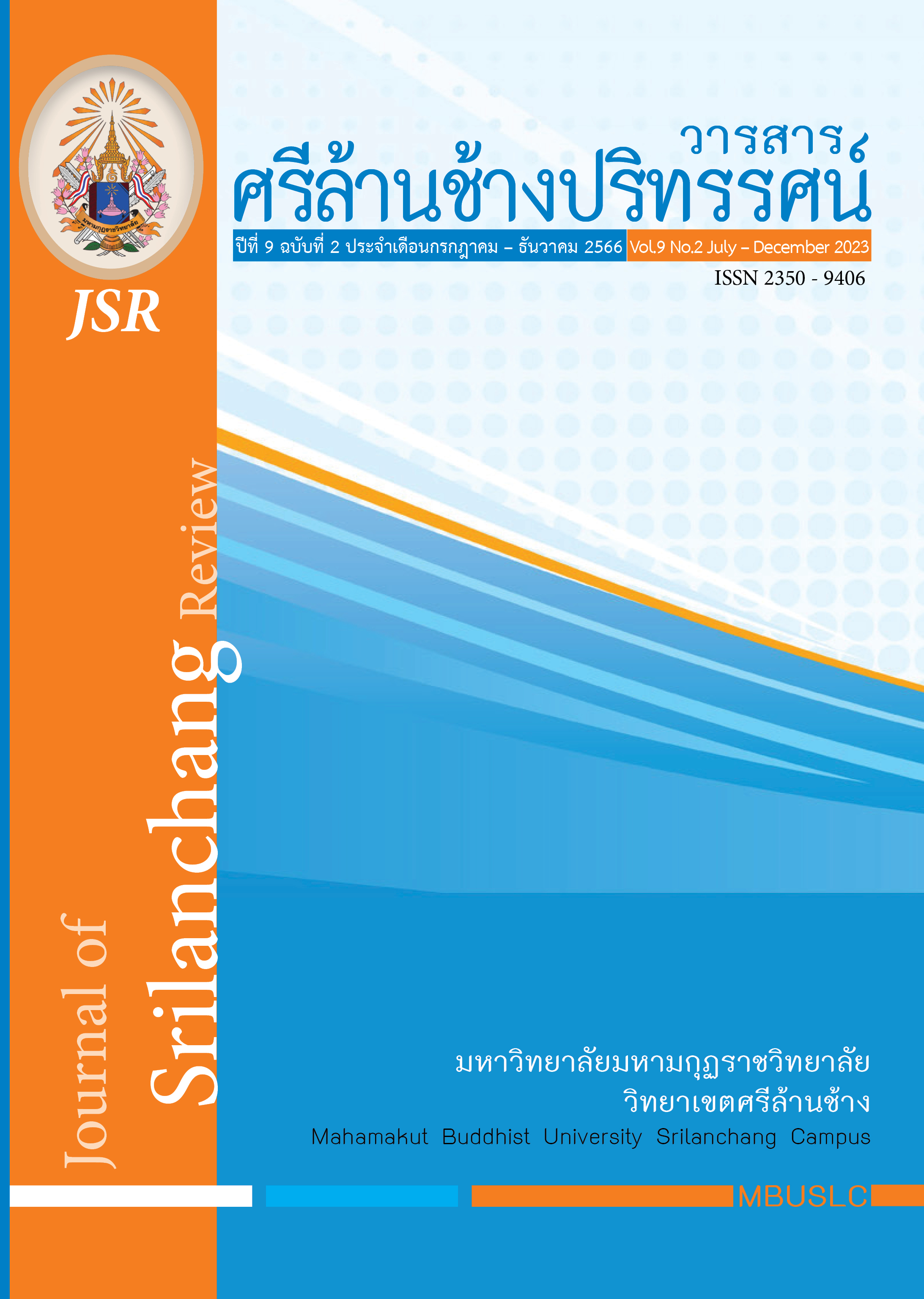PRIVATE SCHOOL MANAGEMENT STRATEGIES ACCORDING TO THE CONCEPT OF INNOVATIVE ORGANIZATION
Main Article Content
Abstract
The purposes of this research were to study 1) conceptual framework related to private school management according to the concept of innovative organization 2) the current state and desirable of private school management according to the concept of innovative organization 3) the improvement of private school management strategies according to the concept of innovative organization. The study used a mixed method research design. The sample were 452 public schools participated with school administrators and teachers. The instruments used in this were an evaluation form of the conceptual framework, questionnaires, and an evaluation from to assess the appropriateness and feasibility of these strategies. The data analyzed by frequency, percentage, mean, standard deviation, PNImodified, and content analysis.
The results showed that:
- The conceptual framework for the private school management consists of three areas: 1) planning; 2) implementation; and 3) evaluation, while the innovative organization framework consists of six areas: 1) innovative organization of structure; 2) innovative organization of leadership; 3) innovative organizational of culture; 4) innovative organizational of climate; 5) innovative organizational of creative behavior; and 6) innovative organizational of entrepreneurship
- The current state of private school management according to the concept of innovative organization, the aspect with the highest average value was innovative organization of structure. While the desirable state of private school management according to the concept of innovative organization, the aspect with the highest average value was innovative organizational of culture.
- Private school management strategies according to the concept of innovative organization consists to six main strategies: 1) reinventing the structure organizational of private schools to become innovative school; 2) development innovative leadership for personnel of private schools to become innovative school; 3) reform the organizational culture of private schools to become innovative school; 4) promote climate of private schools to become innovative school; 5) enhance creative behavior for personnel of private schools to become innovative school; and 6) drive entrepreneurship of private schools to become innovative school, with 18 sub-strategies and 51 procedures.
Article Details

This work is licensed under a Creative Commons Attribution-NonCommercial-NoDerivatives 4.0 International License.
บทความที่ได้รับการพิจารณาจากคณะกรรมการผู้ทรงคุณวุฒิและเผยแผ่ในวารสารฉบับนี้ เป็นทัศนคติและข้อคิดเห็นส่วนบุคคลของผู้เขียนแต่ละท่าน ไม่ถือว่าเป็นทัศนะคติและความรับผิดชอบ
ของบรรณาธิการ
บทความ ข้อมูล เนื้อหา รูปภาพ ฯลฯ ที่ได้รับการตีพิมพ์ในวารสารศรีล้านช้างปริทรรศน์ ถือเป็นลิขสิทธิ์ของวารสารศรีล้านช้างปริทรรศน์ หากบุคคลหรือหน่วยงานใดต้องการนำทั้งหมดหรือส่วนหนึ่งส่วนใดไปเผยแพร่ต่อหรือเพื่อกระทำการใด ๆ จะต้องได้รับอนุญาตเป็นลายลักอักษรจากวารสารศรีล้านช้างปริทรรศน์ ก่อนเท่านั้น
References
ชวน ภารังกูล. (2556). การศึกษาความเป็นองค์กรนวัตกรรมของสถานศึกษาขั้นพื้นฐานสังกัดสำนักงานคณะกรรมการการศึกษาขั้นพื้นฐานในจังหวัดราชบุรี. ราชบุรี: มหาวิทยาลัยราชภัฏหมู่บ้านจอมบึง.
ธารา ทวีโภค. (2559). คุณลักษณะที่ดีของผู้ประกอบการวิสาหกิจขนาดกลางและขนาดย่อม. กรุงเทพฯ:มหาวิทยาลัยราชภัฏธนบุรี.
นพพงษ์ บุญจิตราดุลย์. (2551). โน้ตย่อบริหาร. เชียงใหม่: ออเร้นจ์ กรุ๊ป ดีไซด์.
ประกาศ เรื่อง ยุทธศาสตร์ชาติ (พ.ศ. 2561-2580), ราชกิจจานุเบกษา.เล่ม 135 ตอนที่ 82 ก วันที่ 13ตุลาคม 2561 หน้า 7.
ประจักษ์ ปฏิทัศน์. (2562). การคิดเชิงระบบและความคิดสร้างสรรค์. กรุงเทพฯ: สำนักพิมพ์แห่งจุฬาลงกรณ์มหาวิทยาลัย.
ปาฑ์ ไกรวิญญ์. กลยุทธ์การบริหารโรงเรียนเอกชนระดับมัธยมศึกษาตามแนวคิดการพัฒนานักเรียนให้มีภาวะผู้นำอย่างคล่องแคล่ว. วิทยานิพนธ์ดุษฎีบัณฑิต (การบริหารการศึกษา). คณะครุศาสตร์จุฬาลงกรณ์มหาวิทยาลัย.
พจนานุกรม ฉบับราชบัณฑิตยสถาน พ.ศ. 2554. (2563). นวัตกรรม. ออนไลน์. สืบค้นเมื่อ 28 ตุลาคม 2564,แหล่งที่มา https://dictionary.orst.go.th/
วลีรัตน์ ฉิมน้อย. กลยุทธ์การบริหารงานวิชาการโรงเรียนเอกชนระดับประถมศึกษาตามแนวคิดคุณลักษณะพลเมืองคุณภาพในศตวรรษที่ 21. วิทยานิพนธ์ดุษฎีบัณฑิต (การบริหารการศึกษา). คณะครุศาสตร์จุฬาลงกรณ์มหาวิทยาลัย.
สำนักงานคณะกรรมการส่งเสริมการศึกษาเอกชน. (2560). แผนพัฒนาการศึกษาเอกชน พ.ศ. 2560-2564.กรุงเทพฯ: สำนักงาน.
สำนักงานนวัตกรรมแห่งชาติ. (2553). การจัดการนวัตกรรมสำหรับผู้บริหาร (พิมพ์ครั้งที่ 3). กรุงเทพฯ:สำนักงาน.
สำนักงานเลขาธิการสภาการศึกษา. (2565). การจัดการศึกษาขั้นพื้นฐานของโรงเรียนเอกชน : สภาพและแนวทางการสนับสนุน. กรุงเทพฯ: สำนักงาน.
สำนักงานเลขาธิการสภาการศึกษา. (2564). รายงานการศึกษาความร่วมมือระหว่างรัฐกับภาคเอกชนในการพัฒนาการศึกษาตามกฎหมายและแผนปฏิรูปประเทศด้านการศึกษา. กรุงเทพฯ: สำนักงาน.
สุกัญญา แช่มช้อย. (2555). แนวคิดเชิงนวัตกรรมสำหรับการบริหารสถานศึกษาในศตวรรษที่ 21. วารสารศึกษาศาสตร์มหาวิทยาลัยนเรศวร, 14(2). พฤษภาคม-สิงหาคม 2555.
สุวิมล ว่องวาณิช. (2562). การวิจัยประเมินความต้องการจำเป็น (พิมพ์ครั้งที่ 4). กรุงเทพฯ: สำนักพิมพ์แห่งจุฬาลงกรณ์มหาวิทยาลัย.
เสนาะ ติเยาว์. (2551). หลักการบริหาร (พิมพ์ครั้งที่ 6). กรุงเทพฯ: มหาวิทยาลัยธรรมศาสตร์.
Ardashkin, I. B., Martyushev N. V., & Bezborodov, V. P. (2015). Problem methodology as oneof the ways of innovative organization of educational process. Procedia-Social andBehavioral Sciences. 166, pp. 227-231.
Dundon, E. (2002). The seeds of innovation: Cultivating the synergy that fosters new ideas.New York: AMACOM.
Higgins, J. M. (1995). Innovate or Evaporate: Test & Improve Your Organization’s IQ: ItsInnovation Quotient. New York: New Management Publishing Company.
Holder, B. J. & Matter, G. (2008). The Innovative Organization. Retrieved November 3, 2020,from http://www.geocities.com/CollegePark/Library/1048/innova.html.
Pitt Community College. (2011). Planning-Implementation-Evaluation Cycle (PIE Cycle). Retrieved November 9, 2020, from http://www.pitcc.edu/experiencepcc/planning-and-research/planning-and-institutional-effectiverness/PIEInst_WorkunitCycle.pdf.


